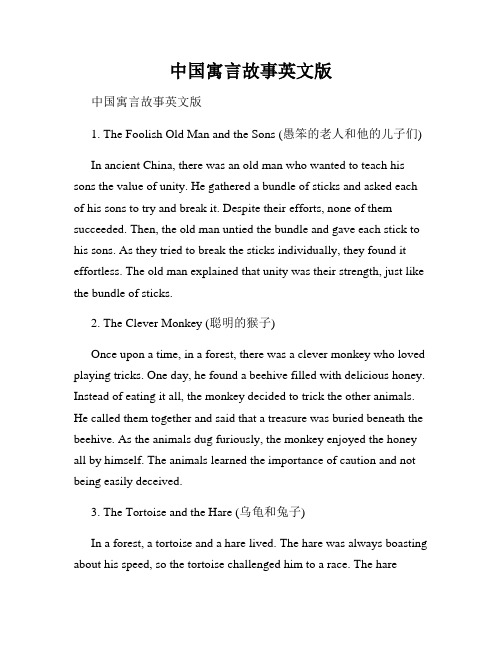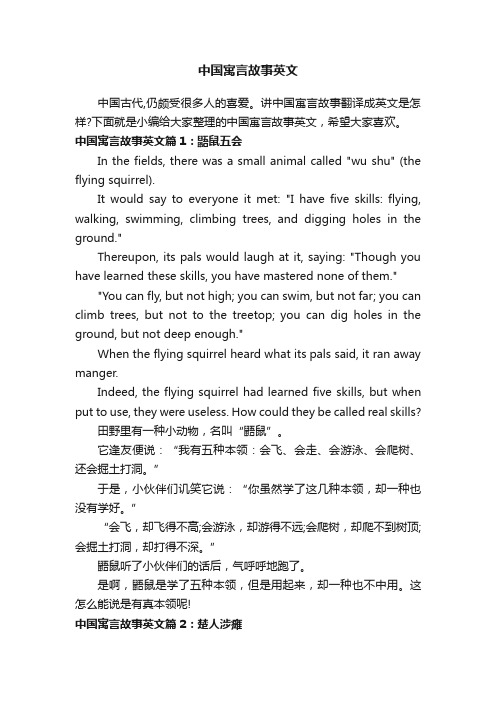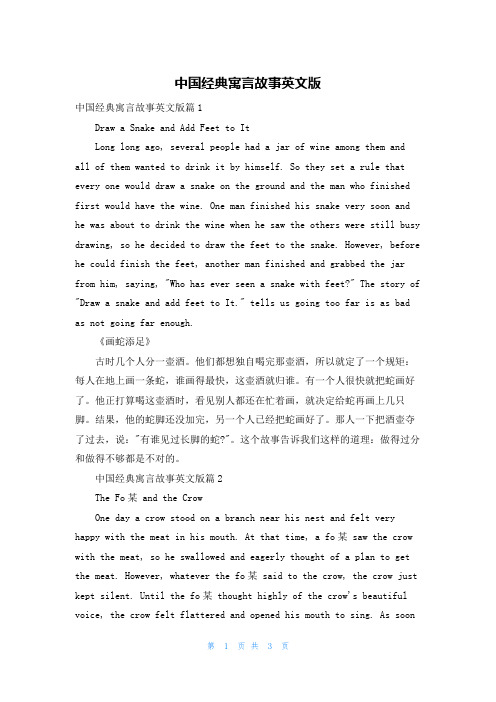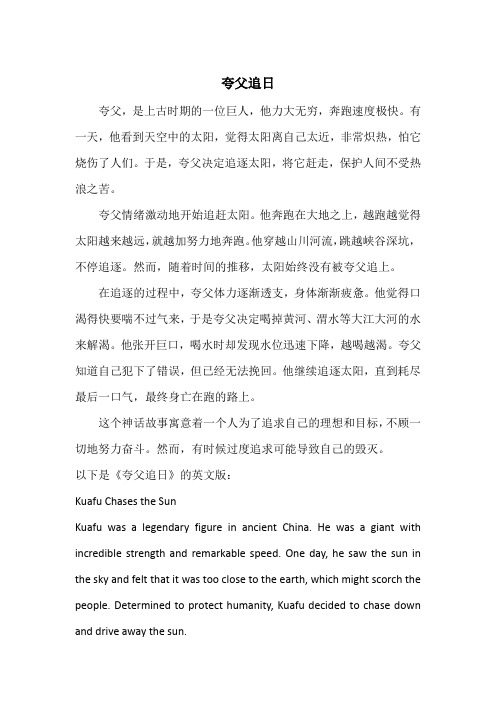以下是一篇著名的英文版中国寓言故事
中国寓言故事英文版

中国寓言故事英文版中国寓言故事英文版1. The Foolish Old Man and the Sons (愚笨的老人和他的儿子们)In ancient China, there was an old man who wanted to teach his sons the value of unity. He gathered a bundle of sticks and asked each of his sons to try and break it. Despite their efforts, none of them succeeded. Then, the old man untied the bundle and gave each stick to his sons. As they tried to break the sticks individually, they found it effortless. The old man explained that unity was their strength, just like the bundle of sticks.2. The Clever Monkey (聪明的猴子)Once upon a time, in a forest, there was a clever monkey who loved playing tricks. One day, he found a beehive filled with delicious honey. Instead of eating it all, the monkey decided to trick the other animals. He called them together and said that a treasure was buried beneath the beehive. As the animals dug furiously, the monkey enjoyed the honey all by himself. The animals learned the importance of caution and not being easily deceived.3. The Tortoise and the Hare (乌龟和兔子)In a forest, a tortoise and a hare lived. The hare was always boasting about his speed, so the tortoise challenged him to a race. The harelaughed, thinking victory was certain. He took a nap during the race, assuming he would easily win. Meanwhile, the tortoise continued at a slow and steady pace. When the hare woke up, he found the tortoise had already crossed the finish line. The tortoise taught the hare that perseverance and consistency are essential to success.4. The Greedy Farmer (贪婪的农夫)Once, there was a farmer who had a magic goose that laid golden eggs. The farmer became greedy and wanted to get all the golden eggs quickly. He thought there must be a lot of gold inside the goose. So he killed the goose, only to find that it was just like any other ordinary goose. The farmer lost the goose that laid the golden eggs, teaching him the lesson that greed leads to loss.5. The Fox and the Grapes (狐狸和葡萄)A hungry fox spotted a ripe bunch of grapes hanging from a vine. The fox tried to reach them but couldn't. He kept trying until tired. Finally, he gave up and said, "Those grapes must be sour and not worth eating." The fox made himself believe that the grapes were undesirable rather than admitting his failure. The moral of the story is that it is easy to despise what we cannot have.6. The Ant and the Grasshopper (蚂蚁和蝗虫)In a field, an ant worked hard to collect food for the winter. Meanwhile, a grasshopper played all day long. When winter arrived,the ant had enough food to survive, while the grasshopper had none. The ant learned the importance of hard work and planning for the future, while the grasshopper learned the consequences of laziness.7. The Fisherman and the Golden Fish (渔夫和金鱼)A fisherman caught a golden fish that turned out to be a magical creature. The fish pleaded to be released in return for granting any wish. The fisherman made extravagant wishes but was never satisfied. Finally, he realized his greed and asked the fish to return him to his humble life as a fisherman. The story teaches that contentment brings true happiness.8. The Dove and the Ant (鸽子和蚂蚁)A dove, flying over a river, noticed an ant struggling in the water. The dove plucked a leaf and dropped it next to the ant, saving its life. Later, the ant returned the favor by biting a hunter who was about to shoot the dove. The story highlights the importance of kindness and the idea that helping others will ultimately benefit oneself.9. The Boy Who Cried Wolf (撒谎的男孩)A mischievous boy lived in a village and often lied about a wolf threatening the flock. The villagers rushed to help him every time, only to discover he had tricked them. Eventually, when a real wolf appeared, the boy cried for help, but no one believed him. The moral is that repeated dishonesty will lead to a loss of trust and credibility.10. The Lion and the Mouse (狮子和老鼠)A mighty lion was caught in a hunter's net. A little mouse, moved by his cries, helped the lion by nibbling through the ropes to set him free. Later, when the lion fell into a trapper's trap, the mouse returned the favor and gnawed through the ropes. The story teaches that even the smallest of creatures can be of great help.These Chinese fables showcase important morals and life lessons that have been passed down through generations.。
中国寓言故事英文

中国寓言故事英文中国古代,仍颇受很多人的喜爱。
讲中国寓言故事翻译成英文是怎样?下面就是小编给大家整理的中国寓言故事英文,希望大家喜欢。
中国寓言故事英文篇1:鼯鼠五会In the fields, there was a small animal called "wu shu" (the flying squirrel).It would say to everyone it met: "I have five skills: flying, walking, swimming, climbing trees, and digging holes in the ground."Thereupon, its pals would laugh at it, saying: "Though you have learned these skills, you have mastered none of them.""You can fly, but not high; you can swim, but not far; you can climb trees, but not to the treetop; you can dig holes in the ground, but not deep enough."When the flying squirrel heard what its pals said, it ran away manger.Indeed, the flying squirrel had learned five skills, but when put to use, they were useless. How could they be called real skills?田野里有一种小动物,名叫“鼯鼠”。
英文版的中国故事

英文版的中国故事以下是一个英文版的中国故事,讲述了一只聪明的猴子如何帮助一位贫穷的老人:Once upon a time, in a small village nestled among the mountains, there lived an old man who was very poor. He had no family or possessions, and he relied on the kindness of strangers to survive.One day, while the old man was collecting firewood in the forest, he heard a cry for help. Following the sound, he found a monkey trapped in a hunter's trap. The monkey looked at the old man with pleading eyes, as if asking for his help.Without hesitation, the old man released the monkey from the trap. The monkey was overjoyed and jumped onto the old man's shoulder, thanking him with a series of chirps and grunts.From that day on, the monkey became the old man's constant companion. Every day, the monkey would bring the old man fruits and nuts from the forest, and they would spend their days together, playing and laughing.But the old man's happiness was short-lived. One day, while the old man was sleeping, a group of thieves broke into his hut and stole all of his belongings. The old man was devastated and didn't know what to do.However, the monkey had a plan. He led the old man to a hidden cave in the mountains, where the thieves had hidden their stolen goods. Together, they retrieved all of the old man's possessions and returned them to his hut.From that day on, the old man and the monkey lived happily together, and the monkey became a hero in the village. People would often come to the old man's hut to hear the story of the clever monkey and how he had helped the old man.This story teaches us that even the smallest act of kindness can have a big impact on someone's life. It also reminds us that animals are capable of great compassion and loyalty, and that we should treat them with kindness and respect.。
中国古代民间故事英文版

中国古代民间故事英文版以下是一篇中国古代民间故事的英文版:The Fox and the TigerOnce upon a time, there was a fox who lived in a forest. One day, the fox met a tiger and was frightened. The tiger threatened to eat the fox, but the fox was quick-witted and said, "Oh, great tiger! How could you eat me? I am the king of the forest, and all the animals tremble at my might." The tiger was skeptical, but the fox continued, "If you don't believe me, follow me and see for yourself." The tiger agreed, and the fox led him deep into the forest.As they walked, the fox called out to all the animals, "Behold, the great tiger is here! He has come to pay his respects to me, the king of the forest."The animals, seeing the tiger, trembled with fear and scattered in all directions. The tiger, seeing this, believed the fox's words and left, allowing the fox to escape.From that day on, the fox became known as the cleverest animal in the forest, and the tiger was left to wonder why he had been so easily deceived.This story teaches us that being quick-witted and resourceful can help us overcome even the most dangerous situations.。
中国寓言小故事英文版简短带译文

中国寓言小故事英文版简短带译文In the heart of ancient China, there was a smallvillage where the people were known for their wisdom and stories. One such story, simple yet profound, tells of a farmer and his ox.This farmer owned an ox that was his faithful companion in all his tasks. Day after day, the ox plowed the fields, carrying the weight of the farmer's hopes and dreams. Butas the years passed, the ox's strength waned, and its steps became slower and slower.One day, the farmer decided it was time to part withhis loyal friend. He tied the ox to a strong tree and leftit there, intending to sell it the next day. As night fell, the full moon cast a silvery glow over the village, and the ox looked up at the sky with tears in its eyes.Just then, a wolf passed by and saw the ox tied to the tree. He smelled the fear in the air and saw an opportunity. The Wolf approached the ox slowly, his eyes fixed on the helpless animal.But before the Wolf could pounce, a young man appeared from the shadows. He was a passing traveler who had heard the ox's sobs and come to investigate. The young man saw the Wolf and quickly understood the situation. Without hesitation, he untied the ox and set it free.The ox, grateful for its freedom, bowed deeply to the young man and disappeared into the night. The next day, the farmer found his ox gone and was devastated. But later, when he was plowing the fields alone, the ox suddenly appeared, stronger than before, and plowed the land with renewed vigor.The farmer was overjoyed to see his loyal friend back. He hugged the ox and wept tears of joy. But deep in his heart, he knew that it was the kindness of the young man who had saved the ox that day that had brought about this miracle.And so, the story teaches us that a kind heart and a willing hand can change the course of destiny. Just as the young man's compassion freed the ox from its bondage, so too can our actions set free the spirits of those who aretrapped, bringing about a more beautiful and harmonious world.**中西寓言:智慧之光**在古老的中国心脏地带,有一个以智慧和故事闻名的小村庄。
中国古代寓言故事英文版简短盲人摸象

中国古代寓言故事英文版简短盲人摸象在中国古代,有六位盲人,他们虽然目不能视,却热切渴望了解周围的世界。
一日,他们听说有一种名叫大象的生物,体型庞大且独特,无人曾亲眼目睹。
出于好奇,他们决定前去探寻这神秘巨兽的真实面貌。
The six blind men gathered together, holding onto each other's shoulders, forming a line as they approached the elephant. The first man, feeling the rough, sturdy texture beneath his fingers, exclaimed, "The elephant is like a great wall, impenetrable and strong!"六位盲人手挽手肩并肩,排成一列走向大象。
首位盲人触碰到其下粗糙坚实质感,高呼:“大象如长城一般,坚不可摧,力大无穷!”Next in line, the second blind man reached out and grasped the elephant's flexible trunk. He declared, "No, it is more like a snake, winding and agile, able to grasp and move objects with ease."紧随其后的第二位盲人伸出手,握住大象灵活的长鼻,反驳道:“非也,它更像一条蛇,蜿蜒灵动,能轻易抓取和移动物体。
”The third blind man, encountering the elephant's broad ear, compared it to a giant fan. "How mistaken you both are!The elephant resembles a large fan, swaying gently to cool the air," he said confidently.第三位盲人触及大象宽大的耳朵,将其比作巨型扇子,自信地说道:“你们都错了!大象如同一把大扇,轻轻摇摆便能驱散热气。
中国经典寓言故事英文版

中国经典寓言故事英文版中国经典寓言故事英文版篇1Draw a Snake and Add Feet to ItLong long ago, several people had a jar of wine among them andall of them wanted to drink it by himself. So they set a rule that every one would draw a snake on the ground and the man who finished first would have the wine. One man finished his snake very soon and he was about to drink the wine when he saw the others were still busy drawing, so he decided to draw the feet to the snake. However, before he could finish the feet, another man finished and grabbed the jar from him, saying, "Who has ever seen a snake with feet?" The story of "Draw a snake and add feet to It." tells us going too far is as bad as not going far enough.《画蛇添足》古时几个人分一壶酒。
他们都想独自喝完那壶酒,所以就定了一个规矩:每人在地上画一条蛇,谁画得最快,这壶酒就归谁。
有一个人很快就把蛇画好了。
他正打算喝这壶酒时,看见别人都还在忙着画,就决定给蛇再画上几只脚。
有趣的中国寓言故事-夸父追日(中、英文版)

夸父追日夸父,是上古时期的一位巨人,他力大无穷,奔跑速度极快。
有一天,他看到天空中的太阳,觉得太阳离自己太近,非常炽热,怕它烧伤了人们。
于是,夸父决定追逐太阳,将它赶走,保护人间不受热浪之苦。
夸父情绪激动地开始追赶太阳。
他奔跑在大地之上,越跑越觉得太阳越来越远,就越加努力地奔跑。
他穿越山川河流,跳越峡谷深坑,不停追逐。
然而,随着时间的推移,太阳始终没有被夸父追上。
在追逐的过程中,夸父体力逐渐透支,身体渐渐疲惫。
他觉得口渴得快要喘不过气来,于是夸父决定喝掉黄河、渭水等大江大河的水来解渴。
他张开巨口,喝水时却发现水位迅速下降,越喝越渴。
夸父知道自己犯下了错误,但已经无法挽回。
他继续追逐太阳,直到耗尽最后一口气,最终身亡在跑的路上。
这个神话故事寓意着一个人为了追求自己的理想和目标,不顾一切地努力奋斗。
然而,有时候过度追求可能导致自己的毁灭。
以下是《夸父追日》的英文版:Kuafu Chases the SunKuafu was a legendary figure in ancient China. He was a giant with incredible strength and remarkable speed. One day, he saw the sun in the sky and felt that it was too close to the earth, which might scorch the people. Determined to protect humanity, Kuafu decided to chase down and drive away the sun.With great excitement, Kuafu began his pursuit. He ran across the land, feeling that the sun was getting farther away with each step. Undeterred, he ran even faster. He traversed mountains, rivers, and valleys, jumping over deep chasms. However, as time went by, the sun remained out of reach.In the course of his chase, Kuafu’s energy gradually depleted and his body grew weary. He became increasingly thirsty, unable to catch his breath. In an attempt to quench his thirst, Kuafu decided to drink up the waters of the Yellow River and the Wei River. But as he drank, he realized that the water levels were quickly receding. The more he drank, the thirstier he became. Kuafu knew he had made a mistake, but it was too late to rectify it. He pressed on chasing the sun until he had no more strength left, eventually perishing on his relentless pursuit.This myth teaches us a lesson about the dangers of excessive striving and how our pursuit of goals can sometimes lead to self-destruction.。
- 1、下载文档前请自行甄别文档内容的完整性,平台不提供额外的编辑、内容补充、找答案等附加服务。
- 2、"仅部分预览"的文档,不可在线预览部分如存在完整性等问题,可反馈申请退款(可完整预览的文档不适用该条件!)。
- 3、如文档侵犯您的权益,请联系客服反馈,我们会尽快为您处理(人工客服工作时间:9:00-18:30)。
以下是一篇著名的英文版中国寓言故事..读故事的同时也学习下英文单词..
守株待兔Staying by a Stump Waiting for More Hares To Come and Dash Themselves Against It
相传在战国时代宋国,有一个农民,日出而作,日入而息.遇到好年景,也不过刚刚吃饱穿暖;一遇灾荒,可就要忍饥挨饿了.他想改善生活,但他太懒,胆子又特小,干什么都是又懒又怕,总想碰到送上门来的意外之财。
奇迹终于发生了。
深秋的一天,他正在田里耕地,周围有人在打猎。
吆喝之声四处起伏,受惊的小野兽没命的奔跑。
突然,有一只兔子,不偏不倚,一头撞死在他田边的树根上。
当天,他美美地饱餐了一顿。
从此,他便不再种地。
一天到晚,守着那神奇的树根,等着奇迹的出现。
成语“守株待兔”,比喻亡想不劳而得,或死守狭隘的经验,不知变通。
Staying by a Stump Waiting for More Hares To Come and Dash Themselves Against It
This story took place more than 2,000 years ago,in the Warring States period(475-221 B.C.).Tradition has it that in the State of Song at that time there was a man who was famous for staying by a stump waiting for more hares to come and dash themselves against it.
He was a yong farmer,and his family had been farmers for generations.Year after year and generation after generation, farmers used to sow in spring and harvest in autumn,beginning to work at sunrise and retiring at sunset.In good harvest years,they could only have enough food to eat and enough clothing to wear.If there was a famine due to crop failure,they had to go hungry.
This young farmer wanted to improve his life.But he was too lazy and too cowardly.Being lazy and cowardly over everything,he often dreamed of having unexpected blessings.
A miracle took place at last. One day in late autumn,when he was ploughing in the field,two groups of people were hunting nearby.As shoutings were rising one after another,scared hares were running desperately.Suddenly,a blind hare dashed itself headlong against the stump of a dead tree in his field and died.
That day,he ate his fill.
From that day on,he no longer went in for farming again.From morning till night,he stayed by that miraculous stump,waiting for miracles to take place again.
This story comes from"The Five Vermin"in The Works of Han ter generations often use the set phrase"staying by a stump waiting for more hares to come and dash themselves against it"to show grusting to chance and windfalls or dreaming to reap without sowing.It is also used to show adhering to narrow experiences and not being able to be flexible.
塞翁失马Blessing or Bane
战国时期,靠近北部边城,住着一个老人,名叫塞翁。
塞翁养了许多马,一天,他的马群中忽然有一匹走失了。
邻居们听说这件事,跑来安慰,劝他不必太着急,年龄大了,多注意身体。
塞翁见有人劝慰,笑了笑说:“丢了一匹马损失不大,没准会带来什么福气呢。
”
邻居听了塞翁的话,心里觉得很好笑。
马丢了,明明是件坏事,他却认为也许是好事,显然是自我安慰而已。
过了几天,丢失的马不仅自动返回家,还带回一匹匈奴的骏马。
邻居听说了,对塞翁的预见非常佩服,向塞翁道贺说:“还是您有远见,马不仅没有丢,还带回一匹好马,真是福气呀。
”
塞翁听了邻人的祝贺,反而一点高兴的样子都没有,忧虑地说:“白白得了一匹好马,不一定是什么福气,也许惹出什么麻烦来。
”
邻居们以为他故作姿态纯属老年人的狡猾。
心里明明高兴,有意不说出来。
塞翁有个独生子,非常喜欢骑马。
他发现带回来的那匹马顾盼生姿,身长蹄大,嘶鸣嘹亮,膘悍神骏,一看就知道是匹好马。
他每天都骑马出游,心中洋洋得意。
一天,他高兴得有些过火,打马飞奔,一个趔趄,从马背上跌下来,摔断了腿。
邻居听说,纷纷来慰问。
塞翁说:“没什么,腿摔断了却保住性命,或许是福气呢。
”邻居们觉得他又在胡言乱语。
他们想不出,摔断腿会带来什么福气。
不久,匈奴兵大举入侵,青年人被应征入伍,塞翁的儿子因为摔断了腿,不能去当兵。
入伍的青年都战死了,唯有塞翁的儿子保全了性命。
Near China's northern borders lived a man well versed in the practices of Taoism. His horse, for no reason at all, got into the territory of the northern tribes. Everyone commiserated with him.
"Perhaps this will soon turn out to be a blessing," said his father.
After a few months, his animal came back, leading a fine horse from the north. Everyone congratulated him.
"Perhaps this will soon turn out to be a cause of misfortune," said his father.
Since he was well-off and kept good horses his son became fond of riding and eventually broke his thigh bone falling from a horse. Everyone commiserated with him.
"Perhaps this will soon turn out to be a blessing," said his father.
One year later, the northern tribes started a big invasion of the border regions. All able-bodied young men took up arms and fought against the invaders, and as a result, around the border nine out of ten men died. This man's son did not join in the fighting because he was crippled and so both the boy and his father survived.。
